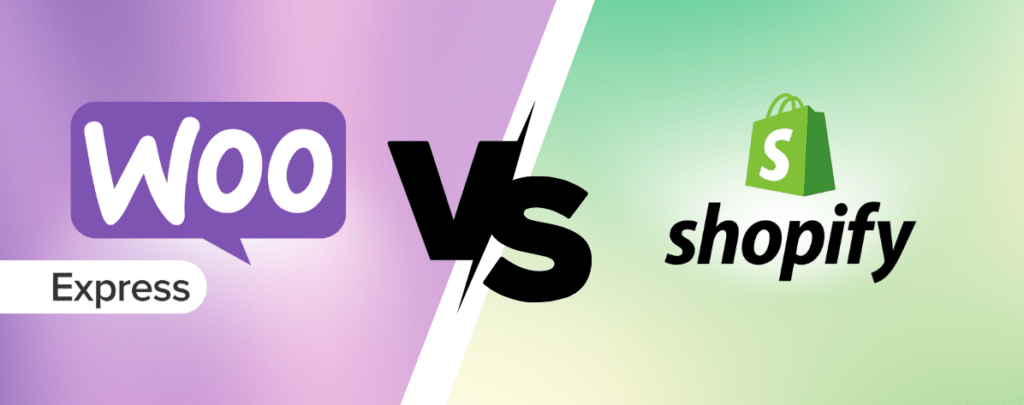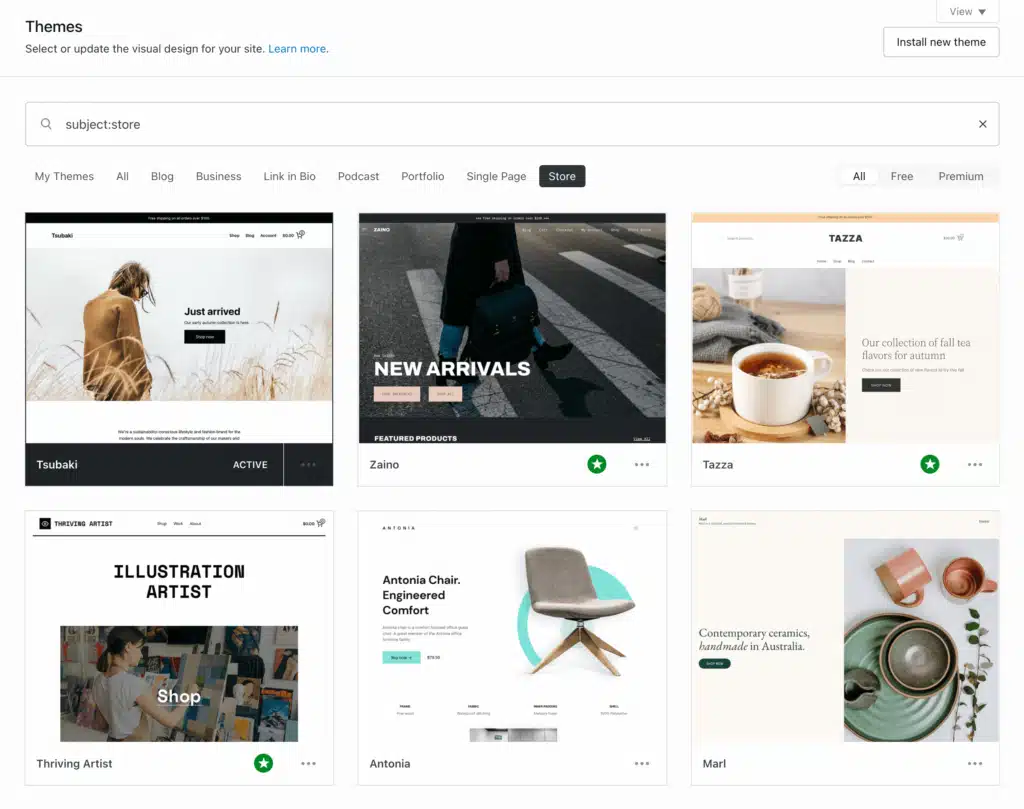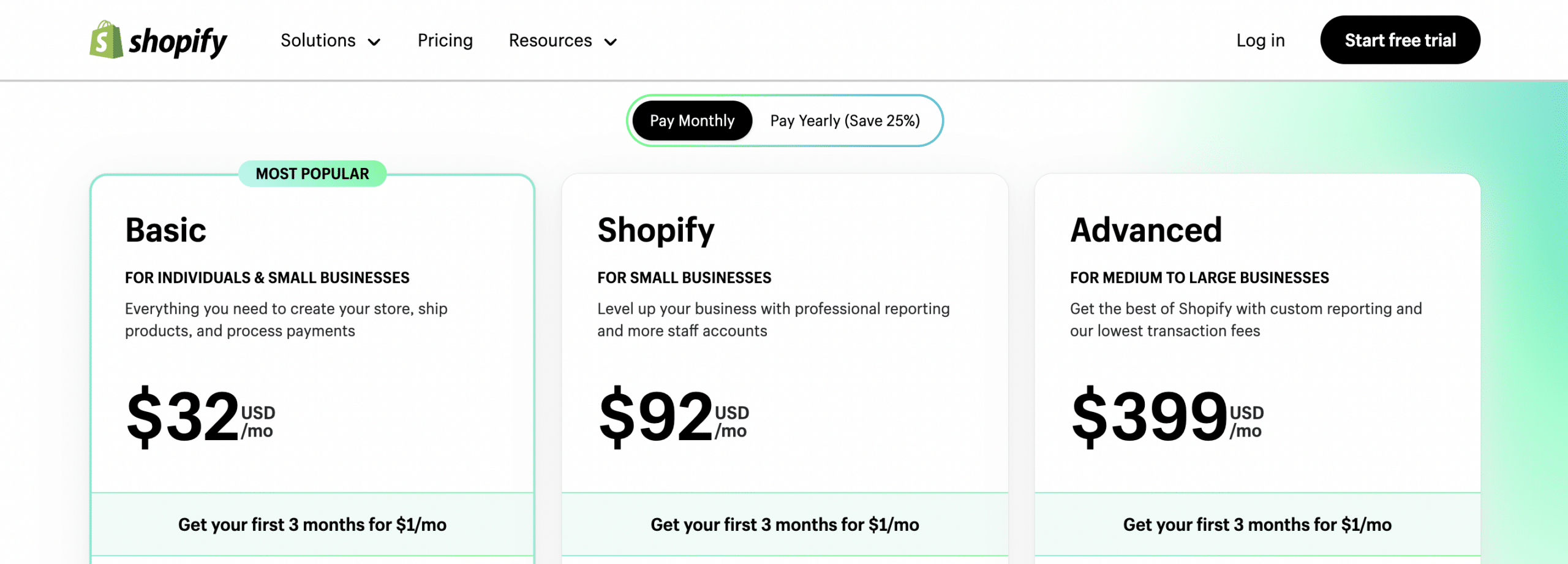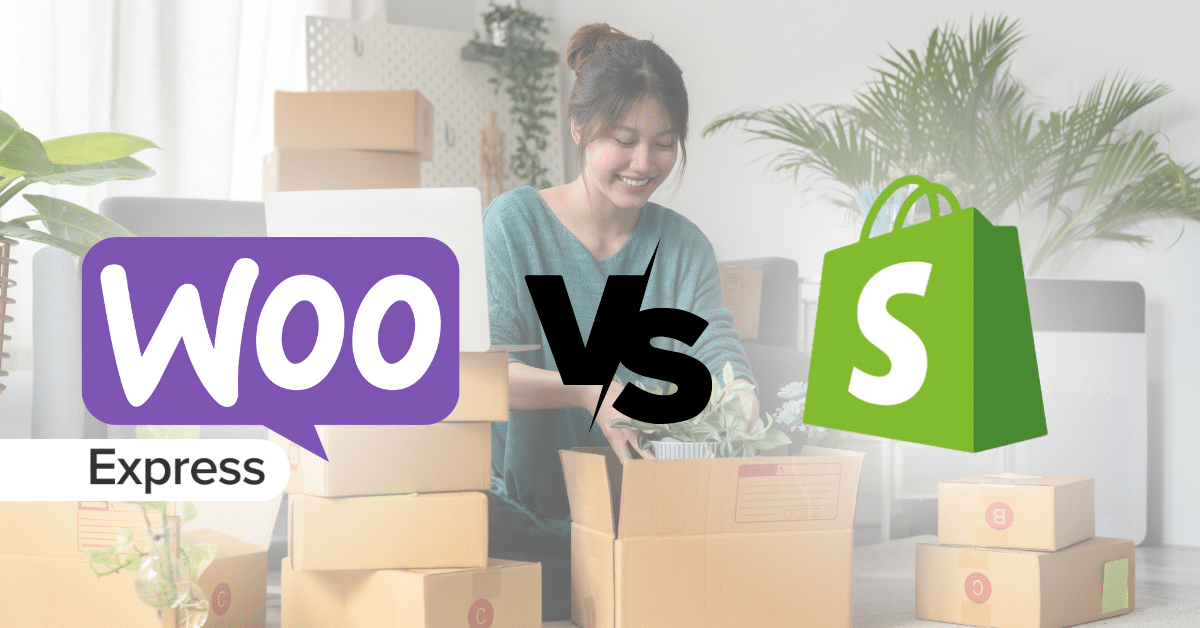Woo Express vs. Shopify — which e-commerce platform comes out on top? We’d love to give you a straight answer, but the truth is, it depends.
If you’re just starting out with building an online business, Woo Express and Shopify are both worthy options. The choice of an e-commerce platform for your store can significantly impact the success of your business. However, when you’re first starting out, you might not know what to look out for.
In this article, we’ll answer the question, “What is the difference between Woo Express vs. Shopify?” We will also provide a detailed analysis of the top features, capabilities, and considerations of both platforms so you can make an informed choice for your business.
TL;DR: Woo Express vs. Shopify at a Glance

- Woo Express is a simplified version of WooCommerce that helps you easily create and manage an online store — with hosting and other important features taken care of for you.
- Shopify is an easy-to-use e-commerce hosting platform that helps you create and run your own online store. It handles everything from product listings to payments and shipping.
- The main difference between Woo Express and Shopify is the nature of the two platforms. Woo Express is part of WooCommerce, built on the open-source WordPress platform. In contrast, Shopify is a closed-source platform.
What is Woo Express?
Woo Express is a managed WordPress hosting solution provided by WooCommerce, a popular e-commerce platform. It is designed to simplify the process of setting up and managing an online store for users who want to use WooCommerce but may not have the technical expertise to handle the hosting and maintenance aspects of a traditional WooCommerce store.
Woo Express provides a simplified, hassle-free WooCommerce experience for those looking to start an online store but may want a more hands-off approach to site management.
Who is Woo Express for?
If you’d like to have full control over your data and your store’s look and functionality, Woo Express is probably the best choice for you. Woo Express offers an easy way to start with WooCommerce, which is an open-source platform with infinite tailoring and scaling possibilities. If you plan to leverage blogging in your Marketing strategy, Woo Express is a great option, as it’s built on WordPress, the most well-established Content Management System around.
Top Features
Top features of WooCommerce include:
- Pre-configured WooCommerce store: it comes with WooCommerce pre-installed and ready to use, so users can focus on building their store without worrying about setup.
- Managed hosting: Woo Express offers hosting services optimized explicitly for WooCommerce, meaning the server is designed for faster loading speeds and better performance for eCommerce websites.
- Automatic updates and security: Woo Express handles WordPress and WooCommerce updates, backups, and security patches, making it easier to keep the store running smoothly and securely.
- Themes and extensions: It often comes bundled with a range of premium WooCommerce extensions and themes, which can enhance the functionality of your store.
- Support: Since it’s a fully managed service, Woo Express includes customer support for technical issues, typically making it more user-friendly for non-technical business owners.
Woo Express vs Woo Commerce: What’s the Difference?
We cannot discuss Woo Express without including its parent platform, WooCommerce, in the conversation. Of the top 1 million most visited e-commerce sites, 23% are built on WooCommerce, and 21% on Shopify. While WooCommerce has been the clear winner regarding customization options, Shopify has been leading the way regarding ease of setup and use. However, with the launch of Woo Express, this might change.
Woo Express is WooCommerce’s newest product, aimed at improving the merchant experience by easing the process of getting started. Similar to Shopify, Woo Express is a managed hosting solution that comes with key extensions already installed and included in pricing, while still providing merchants the freedom to tailor their store with all the WordPress ecosystem has to offer.
To better understand how Woo Express differs from WooCommerce, let’s compare their features and setup.
|
Woo Express |
WooCommerce |
|
|
Hosting |
Fully-managed platform with hosting included |
Requires self-hosting |
|
Ease of use |
Much simpler to use and ideal for non-technical users or those who want a more hands-off approach. |
Requires technical knowledge |
|
Customization and flexibility |
Limited |
Highly customizable and flexible. |
|
Pricing |
Typically comes with a subscription-based pricing model |
Free to use, but you have to pay for hosting, premium themes, extensions, and any additional services you might need |
|
Customer support |
Comes with dedicated support since it’s a managed service, so you can reach out for help with technical issues, hosting, and WooCommerce-related queries. |
The WooCommerce team provides support for the plugin, but you’ll need to rely on your hosting provider for server issues. |
What is Shopify?
Shopify is an e-commerce platform that allows individuals and businesses to create and manage online stores. It provides tools to build websites, list and sell products, handle payments, track inventory, and manage shipping.
Shopify is widely used because it’s user-friendly, doesn’t require coding knowledge, and offers various customizable templates and features, including integrations with third-party apps and services to enhance functionality.
Who is Shopify for?
Shopify is best suited to merchants who want all functionality built in and don’t want to bother with technical details. It provides a very stable and secure closed-source system that has everything you need to get started and grow. Even though expanding your store’s functionality will be limited to Shopify-approved apps and design elements, unless you have very specific business needs, those should be enough.
Top Features
Shopify offers the following features for e-commerce stores:
- Customizable online store themes
- Easy product management
- Integration with multiple payment gateways (including Shopify Payments)
- Mobile-optimized storefront
- Access to a large App Store for added functionality
Features: Woo Express vs. Shopify
| Woo Express | Shopify | |
| Free Trial | 14 days, no credit card required | 3 days, no credit card required |
| Pricing | $32—$399+/month (Annual billing, 25% discount available) |
$32—$399+/month (Annual billing, 25% discount available) |
| Hosting | Fast and secure hosting from WordPress.com | Fast and secure hosting from Shopify.com |
| Ease of Use | Comes with all the tools & resources you need to get started quickly | Built for ease of use and getting your business off the ground fast |
| Customization Options | Open source platform → infinite customization capabilities |
Closed platform → a lot of customization options, but limited to those built into Shopify |
| Data Ownership | You own all your data and can easily export or transfer it at any point | While you own all content produced by you and export options are available, Shopify is a closed platform, so transferring your data accurately to another platform might be challenging |
| Stability and Security | Included SSL certificate (Secure Sockets Layer), allowing an encrypted connection. Ensuring stability requires choosing extensions that have mutual compatibility and keeping them regularly updated. |
Included SSL certificate (Secure Sockets Layer), allowing an encrypted connection. Due to its closed-source nature, Shopify offers a very stable platform with minimal maintenance on the merchant side. |
| SEO | Robust blogging features and a large selection of SEO extensions available through the WordPress ecosystem | While Shopify offers a wide selection of robust SEO apps to enhance your store’s online visibility, the options are not as vast as those of Woo Express. |
| Payment Methods | WooCommerce Payments is included by default, with the freedom to choose any other payment gateway. | Shopify Payments are used by default, with 100+ other payment gateways supported. |
| Expanding Store Functionality | A wide range of extra functionality plugins for WordPress and WooCommerce, and infinite possibilities for developing additional customizations | The Shopify App Store offers a wide range of extensions. However, due to the closed-source platform type, custom solutions cannot be developed. |
| Scalability | Designed to allow scale and supported by the vast WordPress ecosystem | Built to handle stores of all sizes and support business growth |
| Customer Support | Priority free support over email or live chat support with all plans | 24/7 email, phone, and live chat support with all plans |
| Community | A large community of WordPress & WooCommerce users that provides resources, tutorials, and active development support. | Large community of users, experts & developers that offer tutorials, guides, and support. |
Woo Express vs Shopify: Ease of Use
Setting up and managing your online store should be a seamless experience. Woo Express and Shopify are explicitly built to help you launch your e-commerce business quickly, regardless of your technical skills.
Both Woo Express and Shopify eliminate the need for users to find their web host and developer while providing ready-to-use free themes and drag-and-drop interfaces. Regarding user-friendliness, you can’t go wrong with whichever platform you choose.
Woo Express vs. Shopify: Design Customization
Woo Express empowers you with the full capabilities of the WordPress ecosystem, allowing you to choose from a vast selection of themes, plugins, and extensions to create a visually appealing and personalized storefront. Thanks to Woo Express’ open-source nature, all elements of the theme you choose for your store can be further customized to reflect your brand vision.
Shopify offers a range of customizable themes and settings, though the selection is narrower than that of Woo Express. While both platforms offer free and paid themes, premium Shopify themes can be expensive. Nonetheless, Shopify’s robust theme editor enables you to customize layouts, colors, fonts, and other design elements to align with your brand’s vision. However, if you wish to customize specific elements of the theme you’ve chosen, that might not be possible. 
Woo Express vs. Shopify: Data Ownership
Woo Express is an open-source platform, meaning it gives you total control over your store’s data. Any customizations, themes, and extensions you or your developers make to your store are yours. They can be backed up, moved to a different host, and saved for as long as you choose. You fully control how your store functions and can build customizations and features to suit your specific business needs.
On the other hand, Shopify is a closed platform. While it’s quite easy to sign up, customize certain elements, and bring your store online, you can lose all your data if you stop paying Shopify or your account gets closed.
It’s also hard to migrate data from Shopify to other e-commerce platforms. Although Shopify lets you export your store’s data, the structure and organization of the data may not match other platforms perfectly, so you’ll have to do extra work and risk losing data during the migration.
Woo Express vs. Shopify: Stability and Scalability
As you plan for the future and choose an e-commerce platform that can grow with you, it’s essential to understand the actions needed to keep your online store running smoothly. Closed-source platforms like Shopify can provide a more stable experience, with fewer potential issues, since updates are managed for you.
In contrast, open-source platforms like WooCommerce on Woo Express require you to keep up with updates for both the WooCommerce extension and any third-party extensions you use. This is because the WooCommerce team and third-party developers regularly develop security updates. It’s essential to keep your store updated to ensure it remains stable.
Both platforms offer scalability options to accommodate businesses of all sizes. Woo Express, built on WordPress and WooCommerce, provides the advantage of leveraging WordPress’s vast plugin ecosystem while being hosted on the reliable WordPress.com infrastructure, allowing you to scale your store’s functionality as your business grows. Similarly, Shopify’s closed infrastructure is designed to handle stores of various sizes, offering scalability and robust performance to support your store’s expansion.
Woo Express vs. Shopify: SEO
When it comes to e-commerce Search Engine Optimization (SEO), Woo Express and Shopify both offer powerful features to enhance your store’s visibility in search results.
Since Woo Express is part of the popular WooCommerce extension for WordPress, you’re able to choose from a variety of powerful WordPress extensions to optimize your store’s product pages, content, links, and SEO in general. This helps you ensure your products and content are easily discoverable by search engines.
Conversely, Shopify incorporates SEO best practices into its core functionalities, so while you may not be able to customize this as deeply as within Woo Express, Shopify would allow you to optimize metadata, URLs, and content to improve your store’s search rankings.
Woo Express vs. Shopify: Payment Methods

Shopify and Woo Express are on par regarding payment methods and options.
Woo Express has a native payment solution: WooCommerce Payments. It also supports these top 5 payment gateways and hundreds of others. You can use any payment processor that integrates with WooCommerce for your store. With this, you can choose the payment provider that best suits your business.
Shopify also offers its native payment gateway, Shopify Payments, simplifying the payment setup process. Additionally, it can integrate with other external payment gateways, such as PayPal, Stripe, and Authorize.net, ensuring a wide range of payment options for your customers.
Woo Express vs. Shopify: Integrations
Shopify and Woo Express have app ecosystems that make it easy to expand your store’s functionality. However, Woo Express has a slight edge here.
Beyond having its own extensions marketplace, Woo Express also integrates with the vast WordPress plugin ecosystem, offering an extensive collection of marketing, analytics, shipping, and other essential plugins and extensions.

Shopify does not offer as many apps as Woo Express. However, its App Store has numerous applications and integrations that improve different aspects of your store, including marketing, inventory management, and customer service.

Both platforms can also integrate with your accounting tool, saving you time and effort from manual bookkeeping in the long run.
Woo Express vs. Shopify: Pricing
Pricing is a crucial factor to consider when choosing an e-commerce platform. Woo Express provides a fantastic platform to run your WooCommerce store, as it handles the hosting and maintenance for the open-source WooCommerce platform they’ve also built. With two plans ranging from $25 to $40/month, it’s a solid choice and a close alternative to Shopify plans.

Shopify offers pricing plans ranging from $24 to $399+/month, with fees covering hosting, security, customer support, and more. The only additional expense you may need to consider is the cost of a WooCommerce or Shopify developer, should you hire one to assist with customizing or managing your store.

Woo Express vs. Shopify: Customer Support
Woo Express provides priority customer support via live chat and email. You can receive additional support through the WordPress community, forums, and documentation, which may require more independent troubleshooting.
Shopify offers 24/7 customer support via live chat, email, and phone, ensuring prompt assistance whenever you encounter issues or have questions. Similar to Woo Express, Shopify also provides extensive documentation and additional learning resources.
Woo Express vs. Shopify: Community
Lastly, it’s essential to consider each platform’s overall reputation and user community. Building a business comes with its challenges, and you will likely need help along the way. The best advice often comes from those who have already been where you are. Having access to a thriving and active community can provide valuable tutorials, tips, and tricks for building and growing your business in the most efficient way possible.
Woo Express benefits from the wide user base of WordPress and WooCommerce, with a large community that provides resources, tutorials, and active development support.
Similarly, Shopify, a leading e-commerce platform, has a dedicated user community, an extensive knowledge base, and a vibrant ecosystem of developers and experts.
Which E-Commerce Platform Should You Choose?
Ultimately, selecting the right platform will depend on finding the perfect balance between functionality, ease of use, customization options, and scalability for your unique e-commerce venture.
If you’re not very technical and want to get the ball rolling, either platform could work for you. Both platforms offer everything you need to start off the box, with Woo Express being slightly more affordable.

The differences between Woo Express and Shopify will become more apparent as you grow and expand your business and require further customization of both design and functionality.
We recommend that you take advantage of the free trials offered by Woo Express and Shopify to get a feel of each platform and its capabilities. Also, consider the integrations you’ll need and other tools/systems your business uses, and ensure the integrations you choose work well with your chosen platform. When deciding, consider your specific business needs, technical expertise, design preferences, budget, and long-term growth plans.
Woo Express vs. Shopify FAQs
Find answers to common questions about Woo Express and Shopify for e-commerce businesses.
1. What is the Difference Between Woo Express and WooCommerce?
Woo Express is a version of WooCommerce that is streamlined for faster setup and ease of use. It focuses on essential functionalities needed for small to medium-sized online stores. On the other hand, WooCommerce is a fully-fledged, open-source e-commerce platform for WordPress, offering extensive customization options, add-ons, and integrations for businesses of all sizes.
2. Is WooCommerce Better than Shopify?
E-commerce businesses looking for more customization features might find WooCommerce a better platform than Shopify. WooCommerce offers greater control over the store’s design, functionality, and overall structure, making it a preferred choice for businesses with specific requirements or those already using WordPress for their websites.
3. Is it Worth Moving from WooCommerce to Shopify?
The benefits of moving from WooCommerce to Shopify depend on your business needs. Shopify might be a more suitable platform for online stores seeking a more user-friendly interface, quicker setup, and lower maintenance effort. It provides a hosted solution, which means less technical hassle regarding website security and performance.















